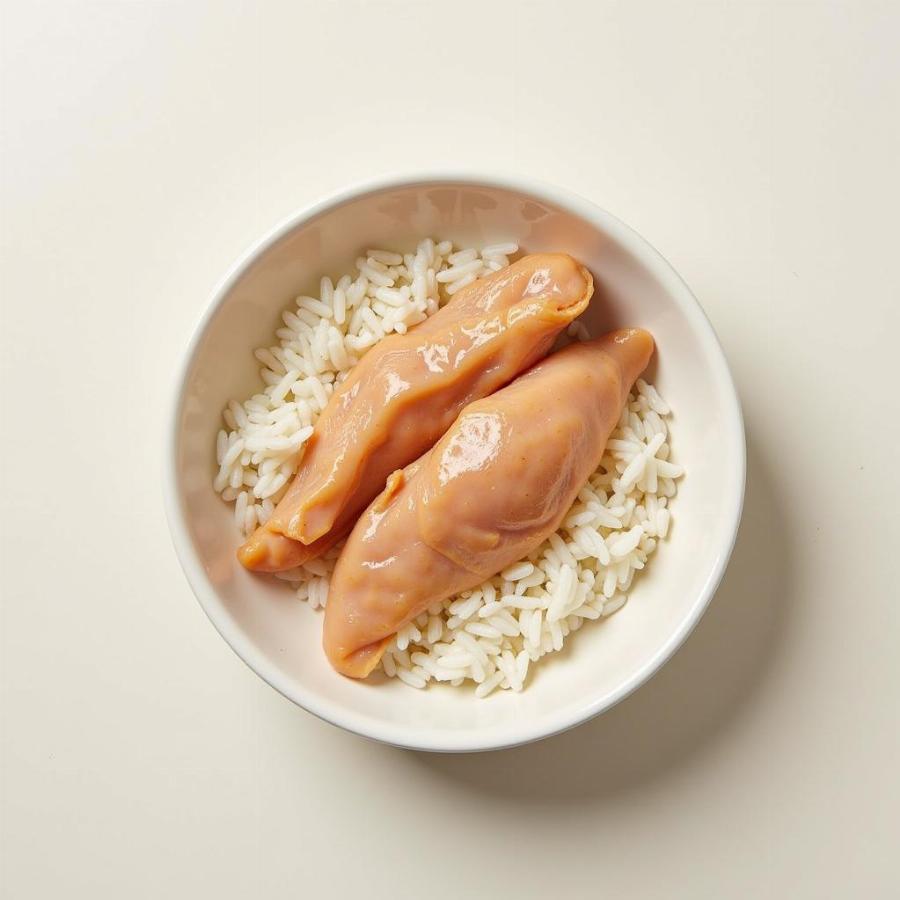Dealing with a dog experiencing diarrhea can be distressing for both you and your furry friend. Finding the right dog food plays a crucial role in managing this issue and restoring their digestive health. This article delves into the best dog food options for dogs with diarrhea, providing you with the knowledge you need to help your canine companion feel better. We’ll explore the causes of diarrhea, the importance of a bland diet, and how to transition back to regular food. Let’s work together to get your dog’s tummy back on track!
Understanding the Causes of Canine Diarrhea
Diarrhea in dogs can stem from various factors, including dietary indiscretions (eating something they shouldn’t), food allergies or intolerances, infections (bacterial, viral, or parasitic), stress, and underlying medical conditions. Identifying the underlying cause is essential for effective treatment. While this article focuses on dietary management, consulting your veterinarian is crucial for a proper diagnosis and to rule out any serious health concerns.
The Power of a Bland Diet for Dogs with Diarrhea
A bland diet is often recommended for dogs with diarrhea as it’s gentle on the digestive system and helps solidify their stool. This type of diet typically consists of easily digestible ingredients that are low in fat and fiber.
Key Ingredients for a Bland Diet
- Boiled Chicken: Skinless, boneless chicken breast provides lean protein.
- White Rice: Easily digestible and helps bind the stool.
- Plain Cooked Sweet Potato: A good source of vitamins and minerals, but use in moderation.
What to Avoid in a Bland Diet
- Dairy products: Many dogs are lactose intolerant, which can worsen diarrhea.
- Fatty foods: High-fat content can exacerbate digestive upset.
- Artificial sweeteners and additives: These can irritate the digestive tract.
 Thức ăn cho chó bị tiêu chảy
Thức ăn cho chó bị tiêu chảy
Best Dog Foods for Diarrhea
While a homemade bland diet is often effective, several commercial dog foods are specifically formulated to support digestive health in dogs with diarrhea. These foods typically contain highly digestible ingredients, prebiotics, and probiotics to promote gut health. Look for foods labeled as “sensitive stomach” or “digestive support.”
Choosing the Right Commercial Food
- Read the Ingredient List: Look for easily digestible protein sources like chicken, lamb, or fish. Avoid foods with artificial colors, flavors, and preservatives.
- Consider Probiotics and Prebiotics: These beneficial bacteria support gut health and can help restore balance to the digestive system.
- Consult your Veterinarian: They can recommend specific brands based on your dog’s individual needs and health history.
Transitioning Back to Regular Food
Once your dog’s diarrhea has subsided for 24-48 hours, gradually reintroduce their regular food. Start by mixing a small amount of their regular food with the bland diet or prescribed dog food. Gradually increase the proportion of regular food over several days while monitoring their stool consistency.
When to Seek Veterinary Attention
While dietary changes can often resolve mild cases of diarrhea, it’s essential to seek veterinary attention if:
- Diarrhea persists for more than 48 hours
- Your dog is lethargic or showing signs of dehydration
- There’s blood in their stool
- They are vomiting
FAQ: Common Questions about Dog Food for Diarrhea
1. Can I give my dog yogurt for diarrhea? While some sources suggest plain yogurt, it’s best to avoid dairy products as they can worsen diarrhea in lactose-intolerant dogs. If you are considering this, consult yogurt for dog diarrhea for more information.
2. How long should I feed my dog a bland diet? Typically, a bland diet is recommended for 2-3 days, or until the diarrhea subsides.
3. What are some signs of dehydration in dogs? Signs of dehydration include dry gums, sunken eyes, loss of skin elasticity, and lethargy.
4. Are there any home remedies for dog diarrhea? While dietary changes are the primary treatment for diarrhea, some dog owners use natural remedies. You can find information about this on our page dedicated to dog food vegan.
5. What if my dog has recurring diarrhea? Recurring diarrhea could indicate an underlying health issue, such as food allergies or inflammatory bowel disease. Consult your veterinarian for a proper diagnosis. For some dogs, supplements might be helpful. You can learn more about this in our article on joint supplement for dogs.
6. Can stress cause diarrhea in dogs? Yes, stress can trigger digestive upset, including diarrhea.
7. Should I withhold food from my dog if they have diarrhea? Generally, it’s not recommended to withhold food completely, especially in puppies. However, your veterinarian might advise a short period of fasting in certain cases. Sometimes, diarrhea can be a symptom of other illnesses, such as splenic enlargement in dogs, which requires immediate medical attention.
Conclusion
Choosing the best dog food for dogs with diarrhea is essential for managing their digestive health and ensuring a speedy recovery. By understanding the causes of diarrhea, implementing a bland diet, and gradually transitioning back to regular food, you can help your furry friend feel better. Remember to consult your veterinarian for a proper diagnosis and personalized advice. Providing the right nutrition is key to restoring your dog’s digestive balance and bringing back their happy, healthy self.
Beaut Dogs is your trusted source for all things canine. We’re dedicated to providing valuable information and expert guidance to help you care for your beloved companion. If you need further assistance, contact us at Email: [email protected]. Beaut Dogs is committed to providing accurate and helpful advice for all your dog-related needs. Visit us at https://beautdogs.com to explore more valuable resources.